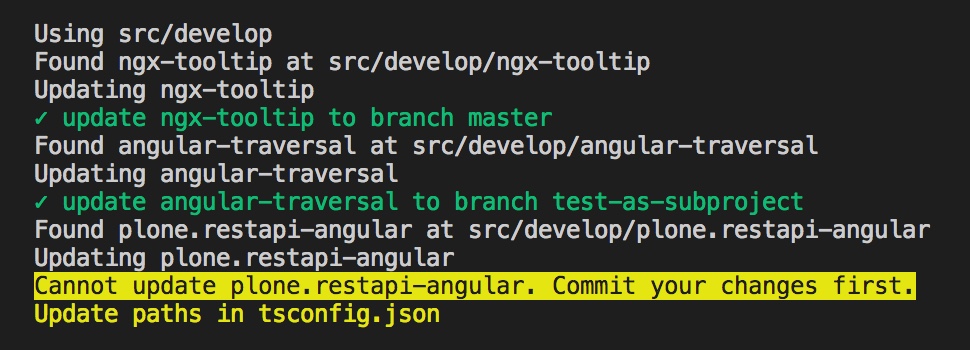mrs-developer is an NodeJS utility that makes it easy to work with NPM projects containing lots of packages, of which you only want to develop some.
Note: mr-developer is mrs-developer's predecessor. It is now obsolete. mr-developer has a dependency to nodegit which is painful to install. mrs-developer depends on simple-git, which does not build the Git library (it just requires to have the git command available in the environment).
It allows to replace any given dependency with a checkout from its Git repository.
The paths to those local checkouts are added in tsconfig.json or in tsconfig.base.json if it exists (or jsconfig.json if we don't use TypeScript).
Dependencies are listed in a file named mrs.developer.json:
{
"ngx-tooltip": {
"url": "https://github.com/pleerock/ngx-tooltip.git"
},
"angular-traversal": {
"url": "https://github.com/makinacorpus/angular-traversal",
"branch": "test-as-subproject"
},
"plone.restapi-angular": {
"path": "src/lib",
"package": "@plone/restapi-angular",
"url": "git@github.com:plone/plone.restapi-angular.git",
"https": "https://github.com/plone/plone.restapi-angular.git",
"tag": "1.3.1"
}
}It also supports mono-repositories with the packages attribute providing a dictionnary of package ids / pathes:
{
"angular": {
"url": "https://github.com/angular/angular.git",
"packages": {
"@angular/core": "/packages/core",
"@angular/forms": "/packages/forms"
}
}
}By using the local property, we can declare a path that will be added in tsconfig.json (no repository will be pulled):
{
"my-package": {
"local": "lib/my/package"
}
}By running the missdev command, those repositories will be checked out in the ./src/develop folder and they will be added into the tsconfig.json file in the paths property, so the compiler will use them instead of the node_modules ones.
Existing paths entries will be preserved if they do not target a folder located in src/develop.
It is possible to keep a package in mrs-developer.json, but don't process it, by setting develop: false. This allows an easier development workflow of those packages, as they can be easier toggled between dev and released modes.
{
"my-package": {
"local": "lib/my/package",
"develop": false
}
}You can override the default output provided via command line per repository in mrs.developer.json.
{
"volto-light-theme": {
"output": "addons",
"package": "@kitconcept/volto-light-theme",
"url": "git@github.com:kitconcept/volto-light-theme.git",
"https": "https://github.com/kitconcept/volto-light-theme.git"
}
}This repository will be checked out in the addons directory, instead of the one provided via command line. It won't prepend the src prefix to it, if you still want it, you should provide it in the output key. This might be useful in combination with monorepos where you want to checkout packages into workspaces folders.
$ missdev
will fetch last changes from each repositories, and checkout the specified branch.
If a repository contains non committed changes or if the merge has conflicts, it will not be updated, and the user will have to update it manually.
$ missdev --no-fetch
will just checkout the specified branches or tags without fetching the remote repositories.
$ missdev --hard
will do a hard reset before updating, so local changes are overriden.
$ missdev --last-tag
will get the last tag (according chronological order) for each epository and will update mrs.developer.json accordingly.
$ missdev --config=jsconfig.json
allows to update a different file than tsconfig.json (might be useful in non-Angular context).
$ missdev --no-config
will not write any config
$ missdev --output=myfolder
will checkout the files in src/myfolder
$ missdev --https
will use the https entry (if it exists) instead of the url entry for each repository
$ missdev --fetch-https
will use the https entry (if it exists) instead of the url entry for each repository, ONLY for the fetch remote
$ missdev --fallback-to-default-branch
will check out the default branch if the requested branch or tag does not exist in the repository.
$ missdev --force-default-branch
will check out the default branch even though another branch or tag is mentioned in mrs.developer.json.
The entry key is used to name the folder where we checkout the repository in ./src/develop.
Properties:
package: Optional. Name of the package that will be mention inpaths. If not provided, default to entry key.path: Optional. Source path in the repository. Will be concatenated to the local repository path intsconfig.json.url: Mandatory. Git repository remote URL.branch: Optional. Branch name, defaults to the remote's default branch. Ignored iftagis defined.tag: Optional. Tag name.develop: Optional. Boolean, can be toggled on/off to activate/deactivate a package. If activated, then deactivated afterwards, the package gets removed fromjsconfigmaintaining the synchronization withmrs.developer.json. Default istrue.output: Optional. Output directory override per repository.filterBlobs: Optional. Used together withtagorbranch, it creates a partial clone defaulting to the tag or branch specified. This partial clone won't clone the whole repository, but only the tag or branch specified.
Create a minimal jsconfig.json file in the project root (see https://code.visualstudio.com/docs/languages/jsconfig):
{
"compilerOptions": {}
}
And run:
$ missdev --config=jsconfig.json
To make sure the jsconfig.json paths defined by mrs-developer are used in Webpack, change your webpack.config.js like this:
const pathsConfig = require('./jsconfig').compilerOptions.paths;
const alias = {};
Object.keys(pathsConfig).forEach(package => {
alias[package] = pathsConfig[package][0];
});
...
resolve: {
...
alias: alias
}
mrs-developer is shamelessly inspired by the well-known mr.developer Python buildout extension.
